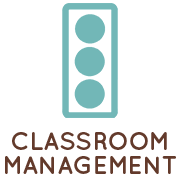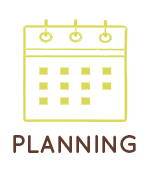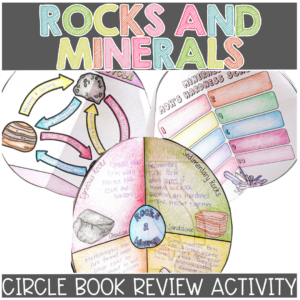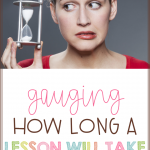
When I first started teaching I remember writing lesson plans and worrying that I was not planning enough for the small amount of time that I had students. I remember worrying that students would whip through the work and then I would be left standing there with nothing for them to do. Judging how long a lesson takes can be a bit tricky the first few years you start teaching.
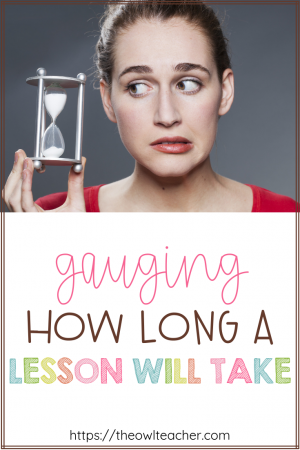
Predicting how long a lesson will take (or any particular activity) can be a bit challenging. Sometimes you run out of time and don’t get to everything, and other times, you end up finishing early and aren’t sure what to do next. I’m here to provide you with some tips to help you with each of these problems, and to gauge how long a lesson takes.
When You Run Out of Time
When you are running out of time, the first thing you need to do is ask yourself why. If you are running out of time because you have too many things planned, then you are trying to cram too much into the small amount of time you have for that particular subject. When we try to cram too much in, we are first over-planning (and we could totally save ourselves that planning time!) and we are causing our students to feel anxiety from rushing. By rushing our students, they aren’t taking the time needed to think deeply about the concepts and the learning isn’t as valuable. It’s definitely more about quality over quantity.
Instead, consider planning one less activity and use the extra time to do things such as:
- Discuss the strategies students used when solving any problems or how they answered the questions
- Ask students probing questions
- Answer questions from students
- Check the work together
- Model for students your thinking
- Think-Pair-Share
- A writing activity such as how they found their answers
- A discussion or friendly debate
Perhaps you are running out of time because you are waiting on all of your students to finish. Sometimes we have slow moving students, but we should not wait on them. If the majority of your class is finished, and you are waiting on your slow-moving students, then your finished students are going to be off-task and bored. This will then create distractions for your students who aren’t finished and potential behavior problems. Ultimately, the very people you are waiting on will be taking even longer due to the finished students who are distracting because of them moving slow!
Even at that, these days we have too many standards to fit into a school year to not move at a decent pace so waiting too long will cause you to get behind. When you’re running behind because of slow-moving students, consider checking out my post on different strategies you can use to help your slow-moving students. Consider moving on and working with those students in small groups at another time or just grading what they have done. There is no rule that states a student has to complete all the problems on a sheet to demonstrate their level of understanding.
Perhaps you are running out of time because students are talking too much. Perhaps it’s because you are spending a lot of time explaining directions, or redirecting behavior. Determine what is actually causing you to run out of time and then find a solution to that particular problem. If you click on the drop-down menu at the top you can find all kinds of classroom management solutions. If there are any time wasters, cut them out.
When You Have Extra Time
Just like with the running out of time, you have to first ask yourself why do you have extra time? Are you personally rushing through things? Are you covering everything? For me, the best thing that I always did for my first few years was write out a more detailed idea of what I wanted to do during each lesson. It was a bit more work, but it helped me know exactly what I wanted to cover so I didn’t miss any important information. I hated when I would think of something later and think “Oh, I wish I had told the kids…”
Think of your lesson plans as a “to-do list” of sorts. It doesn’t need to be as detailed as your college days, but just write out estimated times and what you want to do to help guide you. Include the important things you want to mention to the students and activities. For instance, if you know you want to cover vocabulary write how you are going to do that and an estimation of how long you want to spend on that. Then monitor your time. This also helps guide you so you aren’t rushing through your lesson.
Gauging How Long Lessons Take for All
Ultimately, in the beginning, you will need to write flexibility into your plans. Some lessons will go faster than others based on how well your students grasp the concepts – and this will even vary a little from year to year. The best thing you can do is check with colleagues to get an estimated time and then write that estimate in your plans as a reference. Then after the lesson, refer back to it and write how long it actually took. After a few weeks, you’ll start to notice a bit of a pattern.
When lesson planning keep in mind that as cute as some activities are, as fun as they are, as much as you want to do some activities, you really need to ask yourself if they are aligned with the standards and if they are the best use of your students’ class time. Look for activities that can cover multiple standards, if possible, but are still engaging and not time-consuming.
I always looked at my plans and knew what I could immediately scrap if I needed to (or push to the next day). I also always had a file to pull from if I needed something extra to do. Watch the clock as you are working through your lesson. If you are noticing the time is narrowing down, change the lesson a bit. Instead of having students illustrate the activity, just have them write it, or share it out.
Be realistic in what you plan. Never skip standards because you are falling behind or running out of time. Part of being a teacher is continually reevaluating your lessons. As you gain experience, your ability to estimate how long a lesson takes will improve. Then you will naturally be able to discern the best use of your time and you’ll know when you need to start speeding up or slowing down. However, no matter what year of teaching you are in, the unexpected will happen so always be prepared to make quick changes.


